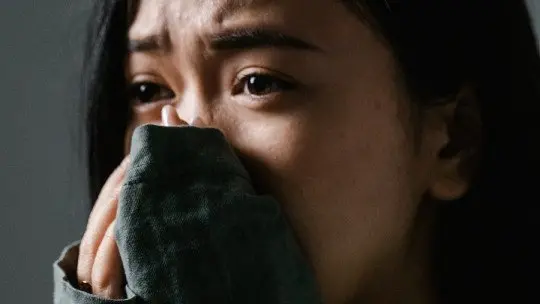Impulse phobias are not dangerous in the sense of posing a direct physical threat. However, they can affect the quality of life and emotional well-being of those who experience them. The fear of causing physical harm that puts the lives of other people at risk usually goes against the will, because there is no conscious intention to cause pain to others.
Given the great uncertainty generated by this fear of losing control, it is important to address impulsive phobias, as they can interfere with a person’s ability to lead a full life and participate in everyday activities. In this PsychologyFor article, we will talk about whether Impulse phobias are dangerous
What are impulse phobias?
Impulsive phobia or fear of harming others refers to the presence of intrusive and disturbing thoughts that generate intense anxiety and fear. Often, Those who suffer from it fear that they may cause harm to other people whether accidentally or intentionally, despite having no real intention to do so.
According to the DSM-5(1), this type of phobia falls within the category of obsessive-compulsive disorders (OCD). Although it is called “impulsion phobia”, the person does not have the real desire to carry out the feared acts; rather, these thoughts are unwanted and cause great distress.
Some examples of common thoughts associated with impulsive phobias include:
- Fear of harming a loved one with a knife.
- Losing control and causing a serious traffic accident.
- Fear of harming a child.
Although those who experience impulsive phobias understand that these thoughts are irrational, the anxiety they generate can be overwhelming.
Are impulse phobias dangerous?
Impulse phobias, in themselves, they are not dangerous in the sense that the person experiencing them has a real inclination or desire to carry out the intrusive thoughts that generate anxiety. These phobias are more of a manifestation of anxiety and irrational fears that cause significant discomfort. In this article, we show you How to overcome irrational fears.
However, the intensity of anxiety associated with impulsive phobias can be detrimental to the quality of life of the affected person. It can affect your emotional well-being, your interpersonal relationships, and your ability to carry out daily activities.
Symptoms of impulsion phobias
Impulse phobias can manifest with a variety of symptoms. These symptoms usually involve intrusive and disturbing thoughts that generate intense anxiety. Next, we will detail the symptoms of the most common impulsive phobias:
- intrusive thoughts: People with impulsive phobias may experience unwanted and disturbing thoughts about harming themselves or others. These thoughts are usually irrational and distressing.
- Fear of losing control: Constant worry about losing control over one’s thoughts or actions is a common symptom. The person may fear acting impulsively and doing something harmful. In this article, we give you more information about Fear of losing control: what it is, symptoms, causes and treatment.
- intense anxiety: The presence of these intrusive thoughts leads to significant anxiety. This can be overwhelming and affect a person’s daily functioning.
- Avoidance of situations: To reduce anxiety, it is common for people with impulsive phobia to avoid situations that could trigger intrusive thoughts. This can affect daily life and personal relationships.
It is important to highlight that the diagnosis and treatment of impulsive phobias must be carried out by mental health professionals, such as psychologists or psychiatrists, who evaluate the clinical conditions of each patient.

Causes of impulsion phobias
Impulse phobias have no single known cause These disorders are usually the result of a combination of genetic, neurobiological, psychological and environmental factors. We see them below:
- Genetics: There is evidence that there is a genetic predisposition for the development of obsessive-compulsive disorders, including impulsive phobias. If there is a family history of OCD or other anxiety disorders, there may be an increased risk.
- Neurobiology: Research suggests that there are alterations in brain function, especially in areas related to the regulation of fear and anxiety. Imbalances in neurotransmitters, such as serotonin, may also play a role in the development of these disorders.
- Psychological factors: Stressful, traumatic, or difficult life experiences can contribute to the development of impulsive phobias. Anxiety related to life events can manifest in intrusive thoughts and compulsions as a way of coping with stress.
- Personality: Some personality characteristics, such as a tendency to worry excessively or be a perfectionist, can increase susceptibility to developing obsessive-compulsive disorders.
- Infections and autoimmune diseases: Some research suggests that bacterial infections or autoimmune diseases may play a role in the development of obsessive-compulsive disorders in some people.
Treatment of impulsive phobias
Treatment of impulsive phobias, as part of obsessive-compulsive disorder (OCD), usually involves a combination of therapeutic approaches and, in some cases, medications. It is important to note that treatment must be personalized according to the specific needs of each person. Here are some common treatment options:
- Cognitive behavioral therapy (CBT): It is one of the most effective approaches for treating impulsive phobias. Exposure and response therapy, a key component of CBT, involves gradually facing the fears and anxieties associated with intrusive thoughts, allowing the anxiety to subside over time.
- Acceptance and Commitment Therapy (ACT) – Focuses on increasing acceptance of intrusive thoughts rather than fighting them. Therapy helps the person commit to personal values and goals, despite the presence of unwanted thoughts.
- Medicines: Selective serotonin reuptake inhibitors (SSRIs) and other antidepressants may be prescribed to help reduce anxiety and symptoms associated with impulsive phobias. Medications can be especially helpful when symptoms are severe.
- Mindfulness and relaxation techniques – Practicing mindfulness and relaxation techniques, such as deep breathing and meditation, can help reduce anxiety and improve coping skills.
- Group support: Participation in support groups can be beneficial as it provides an environment where people can share experiences, strategies, and provide mutual support.
It is essential that if you experience impulsive phobias you look for the help from a mental health professional A therapist, psychologist or psychiatrist can conduct a complete evaluation and design a treatment plan tailored to your specific individual needs. The combination of therapy and, in some cases, medications, can provide an effective strategy for addressing and managing impulsive phobias.

This article is merely informative, at PsychologyFor we do not have the power to make a diagnosis or recommend a treatment. We invite you to go to a psychologist to treat your particular case.
If you want to read more articles similar to Are impulsive phobias dangerous? we recommend that you enter our Clinical Psychology category.
- American Psychiatric Association (2013). Diagnostic and Statistical Manual of Mental Disorders (5th edition). Arlington: Panamericana Medical Publishing.
Bibliography
- Piqueras Rodríguez, JA, Ramos Linares, V., Martínez González, AE, Oblitas Guadalupe, LA (2009). Negative emotions and their impact on mental and physical health. Suma Psicológica Magazine, 16 (2), 85-112.








